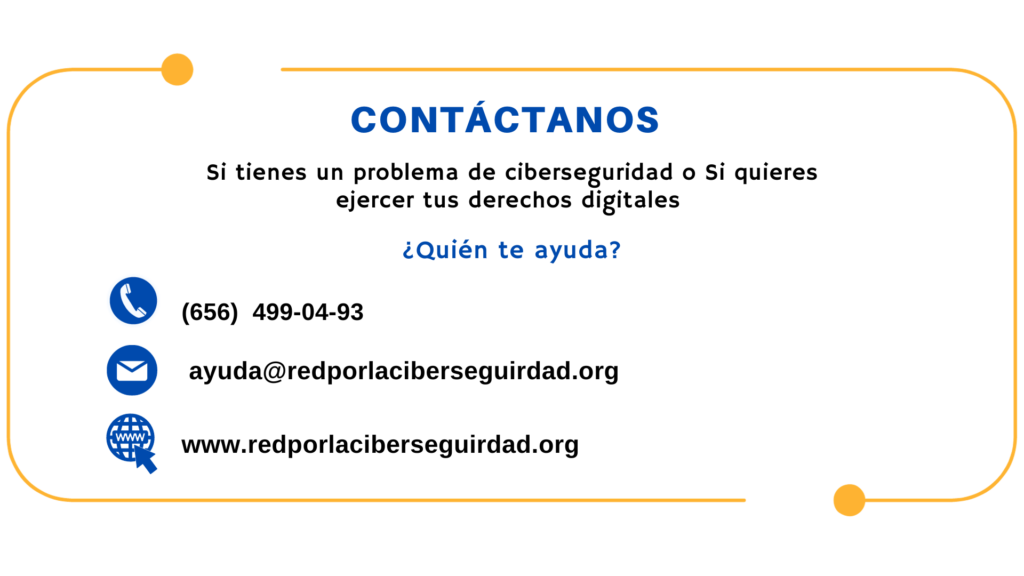11. Cybersecure Father. Tips to promote cybersecurity at home

At some point we have all had to see children stuck and hypnotized by mobile devices, whether it is the child of a stranger, a friend or even our own child.
Lending these devices to children keeps them busy and distracts them a little, allowing us to carry out our homework without any setbacks, however, Have you detenido a pensar las consecuencias de ello?
Many parents are concerned that their children do not do the same activities as they did in their childhood, such as playing sports, having a favorite toy, going out to play with the neighbors, etc. and instead your children are using their smart devices.
Los padres debemos de entender que los tiempos cambian, el entretenimiento, la educación y el cuidado de los infantes hoy en día no es lo mismo que cuando éramos niños. De lo que deberíamos de estar preocupados es sobre los riesgos que existen dentro de la internet.
Main risks that children face on the internet
Inappropriate content
When minors browse the Internet without some filter, they are exposed to content not suitable for their age, such as violent and/or sexual videos.
How do they affect minors?
- Psychological and emotional damage. Violent and sexual content may be disturbing and cause phobias and disorders.
- Misinformation, manipulation and construction of false beliefs. False and lax content can confuse minors.
- Damage to physical health. Some content promotes eating disorders (anorexia and bulimia), self-harm or drug use. Others may encourage children and young people to participate in activities that could endanger their health, such as certain movies or viral internet challenges.
- Join harmful groups or collectives. Access to certain content can bring minors closer to extremist, violent or racist groups, as well as ideological or religious sects, advancement of high-level political groups, etc.
- Economic expenses. Fraudulent attempts to extort money or user data can lead to direct financial losses, as in the case of Premium subscriptions. Furthermore, minors are at greater risk of having to explain and manage the excess advertising to which they are exposed on the Internet, since this can generate in them an impulsive demand for consumption, as is the case of purchasing goods in games and apps

Cyber bullying
The access of girls, boys and adolescents to computers, mobile phones and tablets connected to the Internet facilitates attacks, at any time and with a greater possibility of maintaining anonymity. This type of harassment occurs through text messages, images, videos and other social publications. offensive
Young people who are victims of bullying may suffer from the following problems:
- Eating disorders.
- Sleep disorders.
- Psychological problems.
- Development of low self-esteem.
- Suicidal thoughts.
Sexting
It occurs when photographs, audios or videos of a sexual nature are sent, generally via mobile phone.
The behaviors that threaten sexual intimacy are the following:
- Record audio, record video, photograph or create real or simulated videos of intimate sexual content of a person without their consent or through deception.
- Expose, distribute, disseminate, exhibit, reproduce, transmit, market, offer, exchange and share images, audios or videos of intimate sexual content of a person, knowing that there is no consent, through printed materials, email, telephone messages, social networks or any technological means.
Ley Olimpia
Ley Olimpia It was created in 2018, which consists of a set of legislative reforms a la Ley General de Acceso de las Mujeres a una Vida Libre de Violencia y al Código Penal Federal, que buscan reconocer la violencia digital y sancionar los delitos que violen la intimidad sexual de las personas a través de medios digitales.
Gromming
This term refers to the online practices of adults who try to gain the trust of minors for sexual purposes, which is carried out through social networks, email, text messages, chat sites or online games.
Adults who carry out these practices of digital violence usually create one or more false profiles, posing as children or adolescents, to establish a friendly and trusting relationship with the minor they want to harass.
Grooming can trigger other crimes such as:
- Create and spread material of sexual abuse or exploitation against children.
- Generate personal encounters with girls, boys or adolescents and commit physical sexual abuse.
- Marketing in sexual exploitation networks against children and adolescents.
This type of cyberviolence can generate psychological and physical consequences in young people, derived from manipulation by the adult.

Filter personal data
Las Girls, boys and adolescents do not identify social limits. Therefore, they may publish personal information online. This information can include everything from photographs of personal and uncomfortable moments to your home address.
The information that should be avoided sharing on the Internet is the following:
- Telephone numbers
- E-Mails
- Address
- Chats
- Personal documents.
- Intimate photographs.
Cybersecurity tips for parents
To prevent girls, boys and adolescents face the dangers mentioned in the previous paragraphs, We recommend you follow the following tips:
1# Stay informed
To prevent you have to know. Many parents are unaware of the applications their children use and how they work, so it is important to educate yourself about the apps and networks they use, the dangers they face, and basic knowledge about cybersecurity.
Remember our CiberTip #35: https://www.facebook.com/redporlaciberseguridad/photos/a.112150531416916/146460157985953/
2# Use online protection tools
The use of online tools gives parents a certain degree of control over access to the content that their daughter or son may find on the Internet, this allows them to protect them from online dangers.
One of the main tools related to Internet Service Providers (ISPs) provides parental control options.
Parents also have access to specially designed programs and/or software that block access to websites and restrict the sharing of personal information on the Internet. Others often use the power of programming to monitor and track online activity.
We share more information that may interest you about parental control: https://www.likeinteligente.org/2022/05/01/que-son-los-sistemas-decontrol-parental/?fbclid=IwAR2dmOENiTyT1STRzzUT4FXam0_UFjjJnkr_EWU3zgf11JN9yrP-Y6ZYUF
3# Stay informed of your internet activity
- Create a profile on social networks for your child para menores.
- You must be added to their friends list on their social networks to be aware of their posts.
- Review your search history on the devices you use.
- Utilizar aplicaciones que permiten establecer limites técnicos en dispositivos moviles, tales como: Family Link, Qustodio, Norton Family, Kaspersky safe kids, etc.
- From time to time review the devices used by minors.
4# Establish hours of use
Children have a lot of fun watching videos, playing video games and spending time on social networks and that's fine, but it's not healthy for them to spend a lot of time doing that. They also have other duties like cleaning their room, doing homework, studying, helping with homework. housework, etc. and they must take care of them, just as they also have to take care of their diet and their hours of sleep.
How can I establish healthy usage schedules for my children?
- Prioritize your responsibilities and obligations such as schoolwork, cleaning your room, taking care of your pet (if you have one) and delegating some extra household chores such as washing the dishes or sweeping.
- It is important that you take care of your diet, so if necessary, restrict devices on the table at mealtime.
- Take into account the hours of sleep required, which are between 13 to 8 hours, depending on the age of your child.
- Make sure they also do physical activity for at least 1 hour a day (walking, running, jogging, cycling).
These points will guide you to establish the hours of leisure they need and allow them to use mobile devices.
We share with you some recommendations from a psychologist to create device use schedules for girls, boys and adolescents:
https://cultivandopsicologia.com/2021/10/27/como-poner-limites-con-el-movil/
5# Talk to your children about cybersecurity.
Let them know the risks of the Internet and how to prevent them, teach them how to navigate the Internet safely.
We share a video from our friends at LikeInteligente about technological parenting that may interest you:
https://www.facebook.com/likeinteligente/videos/1005923383400227
6# Respect and coexistence
Promotes best practices in the use of social networks. Prevent your daughters and sons practice Promotes best practices in the use of social networks. Prevent your daughters and sons.
Motivates people to use the Internet well with access to educational and interactive applications.
Promote the responsible use of social networks; Explain to your daughter and son why they should not accept friend requests from strangers.
7# Avoid lending your devices
Lending your personal electronic devices can violate the information they contain, such as: passwords, personal accounts, information in the cloud and banking information.
If you cannot avoid lending your devices, the ideal is to have security controls on them, in addition to activating parental control every time your daughter or son uses it.
bibliographic references
- https://latam.kaspersky.com/resource-center/preemptive-safety/preemptive-safety-tips-for-parents
- https://www.ldgrupo.com.pe/10-consejos-ciberseguridad-padres/
- https://latam.kaspersky.com/resource-center/threats/top-seven-dangers-children-face-online
- https://www.aulaplaneta.com/2015/11/20/en-familia/cinco-peligros-para-los-menores-en-internet-y-como-prevenirlos
- https://porunusolove.elmundo.es/contenido-inapropiado/las-consecuencias-de-que-tus-hijos-naveguen-por-paginas-inapropiadas

